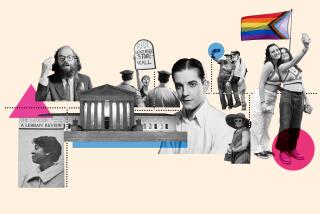Where Do We Draw the Lines of Privacy in Our Public World?
- Share via
“What do you think, Mrs. Reynolds?”
My students often ask me about matters that have nothing to do with grammar or syntax but everything to do with modern life: politics, religion, sex, cyberspace, alien abduction, designer drugs--things not only Horatio and his philosophy never dreamed of, but which Shakespeare himself undoubtedly never pondered either.
During a class reading of Arthur Miller’s “Death of a Salesman,” when Hap Loman states that he goes to women “whenever I feel disgusted,” a student blurted out, “Hey, Mrs. Reynolds, do you think they should give out condoms in school?”
Now, I was prepared to discuss the play in terms of theme, imagery, symbolism and characterization, not the distribution of birth-control in public schools. I told my student to pose that question to the school nurse or, better yet, to his parents. Then I moved on to Miller’s use of foreshadowing.
Other times, I find that the Socratic method is still the best solution to all things gray. I slip out of these sticky inquires by stating, “I don’t know. What do you think?”
Being confronted with uncomfortable questions is one of the hazards of being an English teacher. Great literature by its very nature engages its readers in a process of societal and self-evaluation. Yet questions that most of us in our youth would never have posed so openly are increasingly becoming the classroom norm as our society blurs the distinction between what is considered private and what is a public concern.
Recently, while visiting my family in San Francisco, I had occasion to telephone the public library. My call was greeted with this convivial recording: “The library will be closed in honor of Gay, Lesbian, Bisexual and Transgender Pride Day.”
I was glad it was I and not my 8-year-old daughter who had placed the call; I don’t think I’m ready to explain to her what the term “transgender” means (actually, I’m not sure I know).
As if orchestrated by a divine wit, just as I hung up the phone, a panel on CNN was discussing the firing of a New York public school teacher for preaching Christianity to her students.
Now, I couple these two events together not as an example of good and bad public decorum. To me, these two events are just more examples of our confusion over what is private and what is public.
*
Should children not have access to a local library in order to honor a given group’s public espousal of their sexual orientation? Should a teacher be fired for turning her podium into a pulpit? When do people have the right to turn their personal choice into a public platform?
I don’t know. What do you think?
We live in a time when all things private seem to lack legitimacy unless they are given some sort of public affirmation. The airwaves and the Internet abound with personal confessions, Promise Keepers exhorts thousands standing shoulder to shoulder in a stadium to make public their personal vows of fidelity, others plan picnics around the proud proclamation of their sexual orientation and politicians spend taxpayer money to literally air dirty laundry.
Meanwhile, our children are watching our obsessive need to display our private angst, and I fear this public spectacle is leaving them very cynical.
I guess the best response I can give my students to many of the disturbing dilemmas of our day is to live a life worthy of their question. That they should care at all about what I think is a great honor. Maybe the best answer is to simply to do some quiet contemplation concerning my own personal choices.
Hey, what if libraries closed for a day honoring “private reflection,” and what if promise keepers and promise breakers everywhere observed a day of silence? Could any of us bear to be still before we spoke?
I don’t know, what do you think?
More to Read
The biggest entertainment stories
Get our big stories about Hollywood, film, television, music, arts, culture and more right in your inbox as soon as they publish.
You may occasionally receive promotional content from the Los Angeles Times.










